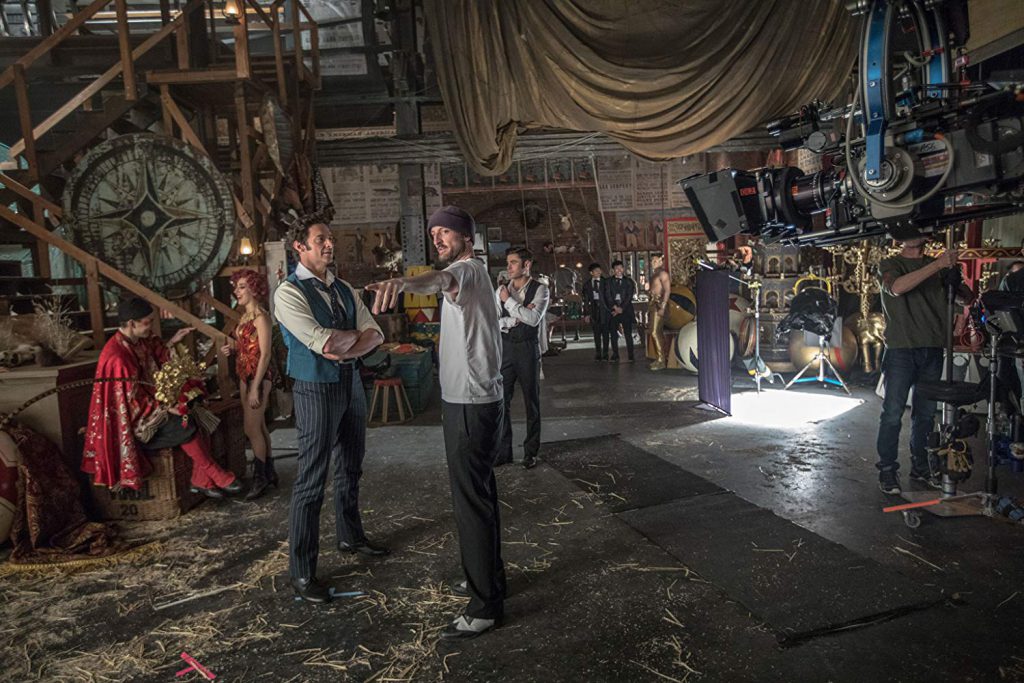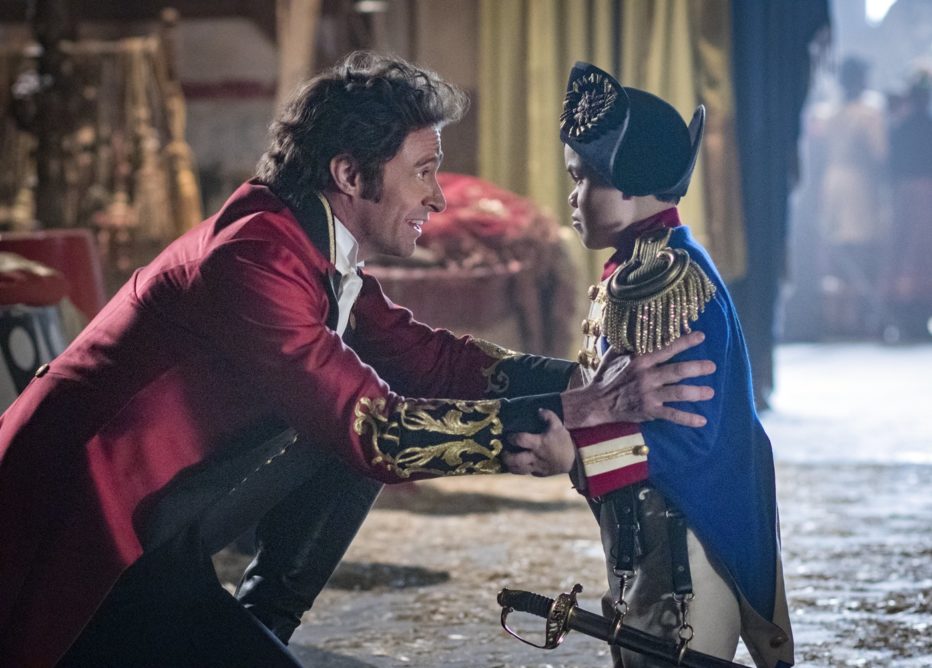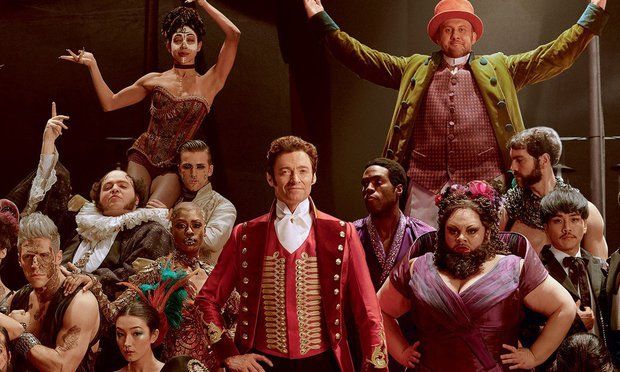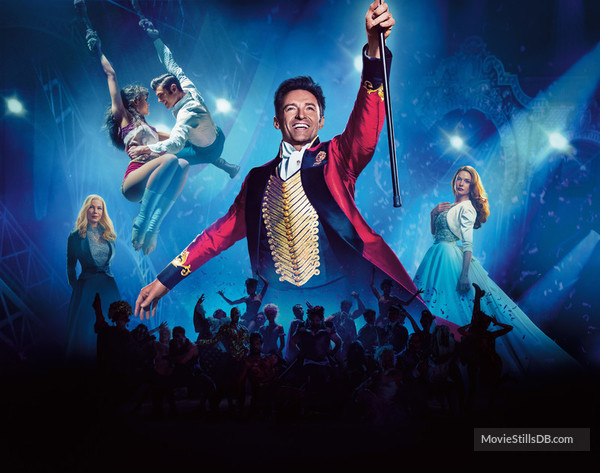By McKenna Scherer and Mina Anderson
A visually and musically dazzling film, The Greatest Showman truly thrives off of its original screenplay and soundtrack. Based on the life of show business visionary P.T. Barnum, The Greatest Showman depicts the struggles of classism, racism and identity, both in the workplace and in society. We’ll be showing The Greatest Showman as a part of the Careers, Conflicts, and Calling series on Saturday, Oct. 19th at 7 p.m. in Stark 103, Miller Auditorium.

Hugh Jackman and director Michael Gracey on set.
The 2017 musical drama follows P.T. Barnum (played by award-winning actor Hugh Jackman) from his childhood through adulthood in the lower class during the 19th century. From being orphaned as a child, joining the masses building railroads, and then falling into a desk job he hates, Barnum struggles to find a true passion. Despite his own personal disdain towards the traditional workplace, he has a wife and two young daughters he pushes himself to fully provide for. Barnum tried to bring new ideas into his desk job workplace but was quickly shut down – just as the entire business shut down as well due to bankruptcy. As that door closed, a curtain opened for Barnum as he made strides to open his own museum, and soon, show business.

Hugh Jackman and Sam Humphrey, starring as Charles Stratton
Not everyone will randomly burst into song with full choreography to get through their life hardships, but The Greatest Showman definitely inspires you to keep a beat in your step through it all. Plus, Hugh Jackman, Zendaya, Zac Efron, Michelle Williams and the rest of the cast make for a rockstar line-up. Here are our five main career takeaways from the film:
Find what you’re passionate about and chase it. In the film, Barnum finally realizes his dream and works through impossible situations to make it come to life. He went through several jobs he didn’t care much about, but he never stopped and settled. He continued to dream, and when he made the important changes and risks necessary to pursue his passion, everything else started to fall into place.
It doesn’t matter where you come from. It should not – and does not – matter what gender, race, sexuality or class status someone is, because everyone has validity in this life. In the film, the oddities in Barnum’s circus came from all different paths of life: The bearded lady was originally an outcast laundry maid, the Siamese twins came from China, the African American trapeze artists performed in a time where racism ran rampant, etc. Yet, once they stopped believing what everyone else told them they were, they thrived.

Shot of the oddities with P.T. Barnum (Jackman).
Your career should not blind you from everything else in life. Barnum gets caught up in the fast rise of his show, ignoring the very motivations and people who got him to where he was. He quickly starts dismissing his own show members and his family, just to chase the lights. Once he realized what he had done, things were already crumbling down around him. Careers are, of course, a major focus in life – especially in college – but there’s a whole world going on around us that should not be neglected.
Be able to take constructive criticism. In the film, there was one critic – Mr. Bennett – who was not at all fond of what Barnum was doing with his show, even using the term “circus” to describe it all – Barnum took that word and spun it into something positive, coining his show the Barnum Circus. The critic ended up improving Barnum’s show since Barnum took his criticisms and turned them into something positive.
Most importantly… Don’t give up. Barnum threw everything he had into creating his show and supporting the oddities. He was ridiculed for supporting those who were different and giving them a literal platform, but he continued to protect his crew and encourage the show. It took time, persistence and a hell of a lot of confidence. The film would not have been nearly as joyous if not for such persistence.

Shot from Zendaya and Zac Efron’s character duet.
With the brightly colored costumes, dazzling vocals, and romantic relationships, The Greatest Showman distracts from and disregards the heinous behavior P.T. Barnum actually participated in during his creation of the circus. Inaccuracies are plentiful, including a disappointing attempt to address racism of the time by integrating Zac Efron and Zendaya’s character romance and Barnum’s outright exploitation of those in his circus. Barnum’s actual path to fame began with his exploitation of the slave Joice Heth – a less-than-inspirational moment in history the film is happy to gloss over. We encourage viewers to engage in conversations on disability and difference as this film and others depict them.
While The Greatest Showman revels in historical inaccuracy, its screenplay and soundtrack convey a positive message: follow your dreams, no matter what anyone thinks. It won the Golden Globe for Best Original Song in 2018 as well as nominations for Best Motion Picture in Musical or Comedy and Best Performance by an Actor in a Motion Picture for Hugh Jackman. During the 2019 Grammy Awards, the soundtrack producers and singers won the Grammy for Best Compilation Soundtrack and were nominated for Best Song Written for Visual Media. The film was also nominated for an Academy Award in 2018 for Best Achievement in Music Written for Motion Picture, among many other nominations.
The Greatest Showman will show at 7 p.m. on Oct. 19th in Stark 103 Miller Auditorium. For more updates on the showing and the rest of the series, follow Winona State Film Studies on Facebook. We can’t wait to see you there!
Admission is free and the film is open to the general public. The film is rated PG-13.


Trackbacks/Pingbacks